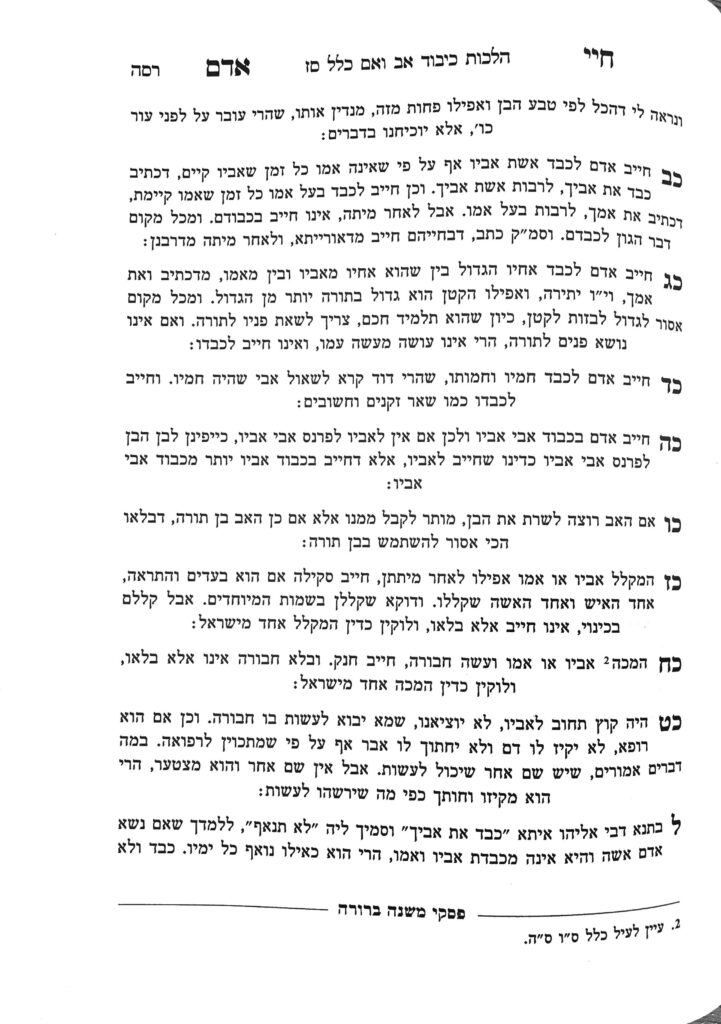We are continuing in siman 26. We learned that if parents wish to serve a child, they may, because retzono shel adam zeh kevodo. However, we learned that the opinion of the Pri Chodosh is that a child may never accept service from a father who is a talmid chochom, even if the father has such a strong desire to serve the child it appears that they will have no chalishas hadaas. We need to understand why the Pri Chodosh still holds it is assur for the child to accept service in such a case
The Sefer Hamakneh explains that when it comes to a father who is a talmid chochom, there are two issues: kavod as a father and kavod as a talmid chochom. We have learned (shiur 1326) that although the Gemara tells us that both a father and talmid chochom can be mochel on their kavod, in the scenario of the Talmud chacham one should still show some form of kavod to demonstrate some element of respect. For example, they should rise slightly when the talmid chochom enter the room, as opposed to rising to full height as they would otherwise be obligated. This demonstration of an element of respect is known as hiddur. Thus, the Sefer Hamakneh suggests that if hiddur is still required even when one is mochel on their kavod, certainly for the father who is a talmid chochom to degrade themselves by performing an act of service for someone beneath them should remain prohibited, even if they are mochel on their kavod.
- On a practical level, a child should certainly not directly ask a parent to serve them, but may ask a parent if they would be interested in helping them, and follow up with their request if the parent is agreeable.
- Additionally, since the issue is a lack of hiddur, if, in the context, the parent performs an act of service which would be normal or understandable for them to do, it is muttar. For example, if a parent is anyways coming to the table, they may bring food for their child. However, if they are already seated, to ask them to get up and get food would be a lack of hiddur.
- Similarly, if a child wishes for their parents to babysit their grandchildren, the child can ask the parents if they are interested in helping, but should not directly ask them if they could please watch the children. A parent is welcome to offer, but a child should not ask directly.
- If a parent and child are fixing something, the child can directly ask for the parent to pass them a tool, because it is clear from the context of the arrangement that it is a normal request to make of someone with whom one is working. If they are not working together, the child can ask the parent if they are interested in helping them, but should not directly ask for an act of service.
Although the Chayei Adam appears to follow the Pri Chodosh and prohibits receiving all acts of service from a father who is a talmid chochom, the minhag haolam is to follow the Ran, and to allow a child to receive service from a father who is a talmid chochom, because of the concept retzono shel adam zeh kevodo.
In siman 27, the Chayei Adam writes that if a child curses their parents, they are chayav misah from beis din. However, the chiyuv misah only applies when one uses one of Hashem’s actual names, rather than a name which we use to refer to Him. If a person does not use one of Hashem’s actual names, they are chayav malkus in the same way one would be chayav malkus for hitting another Jew. We will not discuss further details regarding this halacha, because we will hope it never applies.
Summary
- A child may accept service from their parents, because it is a form of kavod towards the parent to respect their will.
- If their father is a talmid chochom, there are opinions which hold it is assur to accept service, but the minhag is to be meikil and accept the service.
- Practically, a child should not directly ask for service from a parent, but may ask if the parent is interested in helping them and follow up from there. However, if it is clear from the context that it is an acceptable request to make of anyone, it is muttar to ask a parent directly.
- If a child curses their parents with one of Hashem’s actual names, they are chayav misah. If they use one of the names of Hashem which we use as a reference to him, they are chayav malkus.



